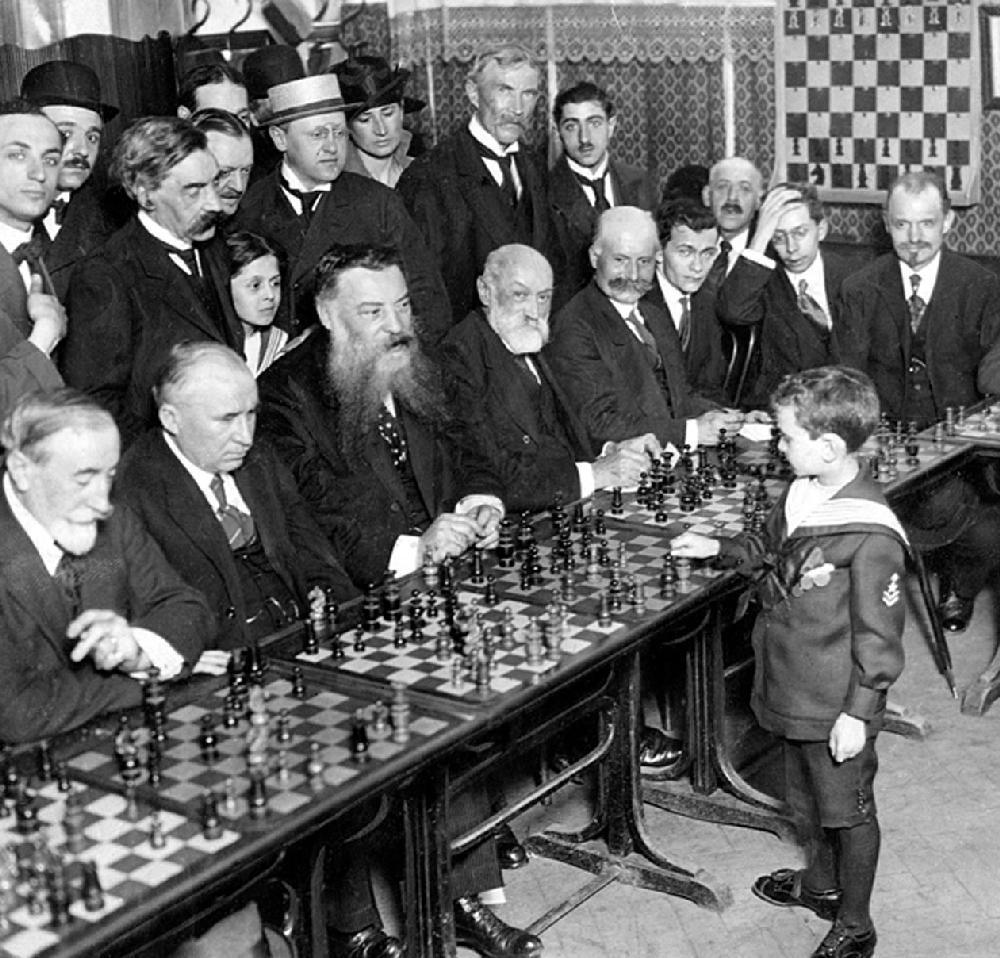
Child Chess Prodigies: Samuel Reshevsky (Poland/America, 1911-92)

Figure 1.-- Here we see 8-year old Samuel Reshevsky in 1920 giving simultaneous chess exhibitions in France, defeatin several French masters. His parents moved to the United States to make a living by publicly exhibiting their child's talent (November 1920). This undoubtedly saved Samuel's and their lives. Reshevsky played thousands of games in exhibitions all over the United States. He played in the 1922 New York Masters tournament. He is believed to be the youngest-ever player to have competed in a strong tournament.
.
|
|
Samuel Reshevsky (1911–1992) was giving simultaneous exhibitions against a room full of adult masters at the age of a mere 6 years., and Reshevsky—while never attaining the title—was amongst the top few players in the world for many decades. Reshevsky was born at Ozorków near Łódź in eastern Poland. His parents were Jewish.
He learned to play chess at the age of 4 years. He was soon acclaimed as a child prodigy. At age 8 years he was beating many accomplished players with ease and giving simultaneous exhibitions against a room full of adult opponentsd. Samuel age 8 years was giving simultaneous chess exhibitions in France (1920). His parents moved to the United States to make a living by publicly exhibiting their child's talent (November 1920). This undoubtedly saved Samuel's and their lives. Reshevsky played thousands of games in exhibitions all over the United States. He played in the 1922 New York Masters tournament. He is believed to be the youngest-ever player to have competed in a strong tournament. Samuel's parents were focused on making a living and did not send him to school. This apparently was fine in Poland, but caused a problem in America. His parents appeared in the District Court in Manhattan facing a charge of improper guardianship. Julius Rosenwald, wealthy co-owner of Sears, Roebuck and Company in Chicago, soon afterwards became Reshevsky's benefactor. He guaranteed Reshevsky's future on the condition that he would complete his education. Reshevsky never became a truly professional chess player. He gave up most competitive chess for 7 years (1924-31). During this time he did successfully competing in occasional events. Reshevsky graduated from the University of Chicago with a degree in accounting (1934). He supported himself and his family by working as an accountant. He srttlked in New York City and lived there or in its suburbs for the rst of his life. He marriaed Norma Mindick (1941). They had three children. A devout Orthodox Jew, Reshevsky would not play on the Jewish Sabbath. His games were thus scheduled accordingly.
HBC

Navigate the Historic Boys' Clothing Web Site:
[Return to the Main chess prodigy page]
[Return to the Main other prodigy page]
[Return to the Main prodigy page]
[About Us]
[Introduction]
[Activities]
[Biographies]
[Chronology]
[Clothing styles]
[Countries]
[Girls]
[Theatricals]
[Topics]
[Bibliographies]
[Contributions]
[FAQs]
[Glossaries]
[Images]
[Links]
[Registration]
[Tools]
[Boys' Clothing Home]
Related Chronolgy Pages in the Boys' Historical Web Site:
[Main Chronology Page]
[The 1860s]
[The 1870s]
[The 1880s]
[The 1890s]
[The 1900s]
[The 1910s]
[The 1920s]
[The 1930s]
[The 1940s]
[The 1950s]
[The 1960s]
Navigate the Historic Boys' Clothing Web style pages:
[Kilts]
[Caps]
[Sailor suits]
[Sailor hats]
[School uniform]
[Scout]
Created: 10:13 PM 9/11/2019
Last updated: 10:13 PM 9/11/2019



